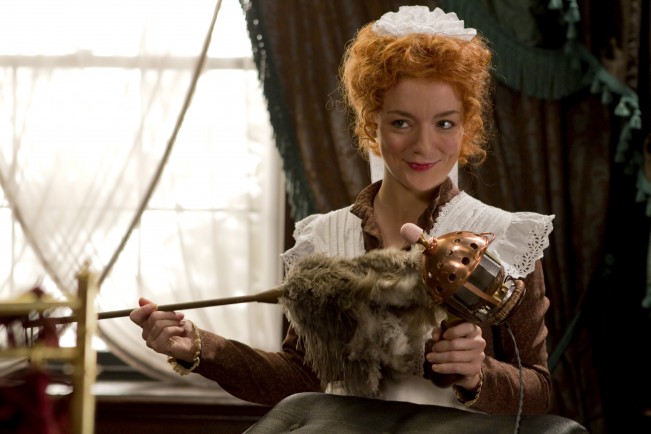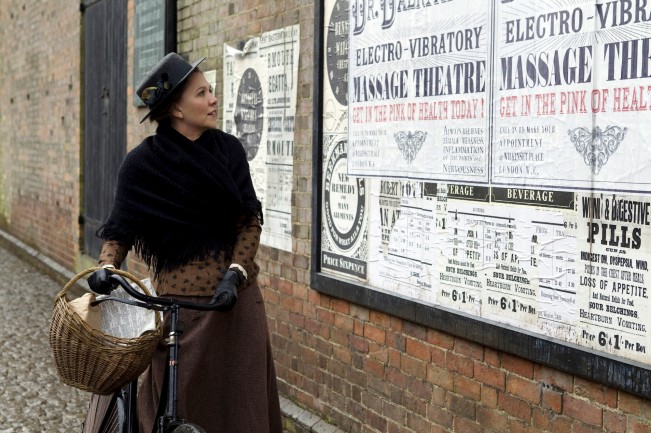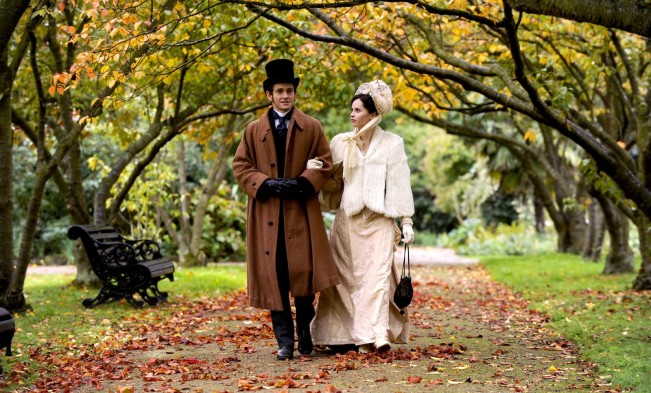
By Andrea Gronvall andreagronvall@aol.com
The Gronvall Files: Interview with Tanya Wexler, Director of Hysteria
Unlike most of the starched, corseted, and repressed female characters that populate her new comedy Hysteria, filmmaker Tanya Wexler is comfortable in her own skin. The ebullient director, 41, who resides in New York with her wife and kids, is frank and funny, and radiated more health and positive energy during a return visit to her Chicago hometown than one would think possible in the middle of a multi-city promotional tour. The Sony Pictures Classics release is a period piece unlike anything you’ve seen before: Hugh Dancy stars as Dr. Mortimer Granville, an idealistic young doctor whose unusually forward thinking costs him job after job in Victorian-era London–until he lands a gig at the clinic of Dr. Robert Dalrymple (Jonathan Pryce), who has built quite a practice curing respectable but frustrated women of the maladies that were then conveniently lumped under the catch-all term “hysteria.” His method? Manual manipulation of the client’s private parts—all in the name of science, of course, with everyone fully clothed. Before long the handsome new physician has become so popular with the ladies that he develops a bad case of carpal-tunnel syndrome. There are also the distractions—pleasant and not so—that are posed by Dr. Dalrymple’s daughters, the demure Emily (Felicity Jones), and the feisty suffragette Charlotte (Maggie Gyllenhaal). But it’s Mortimer’s unconventional long-time friend and benefactor (Rupert Everett) who comes up with a handy solution: the invention of the electric vibrator.
Andrea Gronvall: Comedy is really tough to do well, but you seem to have a strategy. Hysteria starts as farce, when we meet down-on-his-luck Dr. Granville (Hugh Dancy) in the process of losing yet another job. Then, with the introduction of his best friend, the eccentric, aristocratic inventor Edmund St. John-Smythe (Rupert Everett), the movie shifts into a comedy of manners, and later forays into slapstick, showing the effects Edmund’s ingenious new invention has on Mortimer’s satisfied customers. And the laughs build throughout, right up to the tongue-in-cheek punchline at the end.
Tanya Wexler: We drew a lot of inspiration from the great old screwball comedies of the thirties and forties. They layer in all kinds of comedic beats—the more broad, physical ones, the more witty repartee. If you think of most of the comedies Katharine Hepburn or Cary Grant made, there’s certainly banter, but [Howard Hawks’] Bringing Up Baby goes all over the map. And Billy Wilder’s Some Like It Hot, one of my all-time favorite movies! Think of the physical comedy, and the wordplay, and then it has one of the best exit lines ever: “Nobody’s perfect.” It made me laugh–and want to make a movie that’s fun and entertaining, but with something to sink my teeth into.
AG: But Hysteria is also warm and oddly endearing, maybe because almost all the characters, with their assorted flaws, are likable. A lot of that has to do with casting; you picked the right actors for each role. Take Maggie Gyllenhaal, for instance; she can project passion, steel, and vulnerability at the same time. Her headstrong character, Charlotte, is labeled “hysterical,” but Charlotte emerges as the most pragmatic and the clearest thinker of the lot.
TW: She’s the truth-teller.
AG: And Rupert Everett, Jonathan Pryce—what was your thinking in casting them”
TW: I had an amazing casting director [Gaby Kester], but Rupert, Jonathan, Maggie, Hugh—they were all on my wish list. Jonathan was the first actor to come aboard, and when you have somebody like him attached, everyone knows what kind of movie it is, because he’s a class act, and he can do anything, really—dramas, comedies, musicals. He was our anchor: he stuck with us for years while we were trying to get this made.
AG: I caught Hugh Dancy last November on Broadway in Venus in Fur—
TW: I saw it—it’s such a good show!
AG: —playing a character who’s attractive and highly intelligent, but who is also a bit clueless, and winds up swept away by a woman who’s stronger than he is. That’s kind of what happens to Dancy’s character in Hysteria, minus the darkness and the kink.
TW: I saw Hugh in a production of Journey’s End several years ago; I’d seen him do comedy and romantic comedy in films, but it was that stage production more than anything else that sold me on him as an actor.
AG: Speaking of the stage, I was lucky to view one of the best productions in the history of Chicago’s Victory Gardens Theater, Sarah Ruhl’s In the Next Room or the vibrator play. It’s interesting that your film and her play came about at roughly the same time. Same subject, but the tone is very different. Your approach is more antic–more upbeat, certainly–more irreverent. Do you think that audiences are going to be surprised to learn that the vibrator was originally developed as a laborsaving device for male doctors?
TW: That’s my joke! Yeah, the vibrator’s meant for a guy! That’s why guys shouldn’t be threatened now—like, “Dude, you’re tired, but that’s okay, take a break, it’s a member of your team.” I like power tools. I purposely didn’t see In the Next Room when we found out it was being developed in parallel, like [in the case of] the two movies about Truman Capote. My wife saw it, and said it’s really good, but not to worry, because it’s different. I didn’t want to unconsciously crib anything, but I’m dying to see it now, because there needs to be diversity, and the world can handle two works about the vibrator!
The joke is can you believe they really did this: they really thought it wasn’t sex, both the women and the men. We delude ourselves; we’re in denial all the time. Once you make that your core, you engineer the rest of the movie out of that. The truth is the funniest thing of all.
AG: Although show business is not the Wexler family’s only claim to fame, several of your relatives are in the movie industry. Your uncle Haskell Wexler is one of America’s most esteemed cinematographers. I met your filmmaker cousin Mark Wexler when his first documentary feature opened, and I also met your half-sister Daryl Hannah years ago at the Telluride Film Festival. Your family has a home around there?
TW: We did. After my dad [Jerrold Wexler] passed away, my mom sold it. My mom [Susan Wexler] is here; she’s in the other room.
AG: Ah! So, was it a given when you were growing up that you’d wind up in this business, or did you come to filmmaking via a circuitous route?
TW: There was never any pressure. My dad and mom, like most parents, said, “We want you to do your best”–you know, to reach for things. My dad was successful in real estate here in Chicago. If I felt any pressure, it was just that of having a successful parent, and feeling what it means “to do your best” as a very high bar. It’s very hard not to internalize that, what “your best” means. Being the most successful in your community, or whatever? It’s intense, and I don’t think I ever really understood how much pressure [I created] for myself, in a way that can make you really driven. That can actually work against you, because really I think success is just getting on with it–like persistence, putting one foot in front of another.
I went for an undergraduate degree in psychology. I think my dad thought I was just as likely to go into business, or become a psychologist, as anything else. Growing up, my sisters and I were acting semi-professionally, in local Chicago stuff–something we all were passionate about, but that could have easily been almost a hobby. My mom was a huge theatre lover; she was on the board of the Steppenwolf Theatre Company, and we were always at the Goodman Theatre. And I was like a crazy groupie at Second City; I would go over and over again to classes. And I think that actually had as big an effect as anything. Because when you see work that moves you—some people just want that as the experience, but I always wanted to be a part of that. I remember a production of—was that the Organic [Theater Company]?—a production of Hamlet—
AG: Wisdom Bridge Theatre. Aidan Quinn starred. Robert Falls directed.
TW: —that Bob Falls directed, absolutely! [Costarring] Del Close, Byrne Piven. I was 13, 14, and, look: I’ve got the chills, still! That production changed how I saw everything—to spray-paint “To be, or not to be” on the wall, to upend everything and still get the core of it right–that, as much as anything that my family did. It was probably my mom bringing me to the theatre that had the biggest impact. It’s also because she’s in the next room that I’m saying this.
















